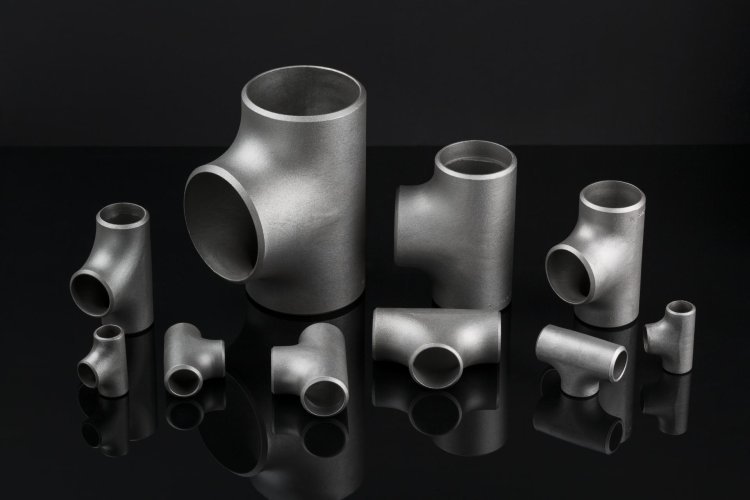Everything You Need to Know About Inconel Pipe Fittings
Discover the unparalleled durability and versatility of Inconel pipe fittings. Learn their key properties, applications, and why they’re essential in high-stress environments

When it comes to industrial piping systems, the choice of materials is critical to ensuring efficiency, reliability, and longevity. Inconel pipe fittings are renowned for their ability to perform under extreme conditions, making them a top choice for demanding industries. In this article, we’ll take a comprehensive look at Inconel pipe fittings, exploring their properties, advantages, applications, and how they stand apart from other materials.
What Is Inconel?
Inconel is a family of superalloys primarily composed of nickel and chromium, designed to withstand extreme environments. Known for their excellent resistance to oxidation, corrosion, and high temperatures, Inconel alloys are widely used in challenging industrial applications.
The most common grades used for pipe fittings include:
-
Inconel 600: Offers excellent resistance to oxidation and corrosion at high temperatures.
-
Inconel 625: Known for its high strength and outstanding resistance to aggressive environments.
-
Inconel 718: Provides exceptional mechanical properties, making it suitable for both high-temperature and cryogenic applications.
Key Features of Inconel Pipe Fittings
1. Corrosion Resistance
Inconel pipe fittings are highly resistant to a wide range of corrosive substances, including acids, seawater, and caustic chemicals. This property makes them ideal for chemical processing and marine applications.
2. High-Temperature Performance
Inconel retains its mechanical strength and structural integrity even at temperatures exceeding 2,000°F (1,093°C). This makes it the material of choice for high-temperature systems, such as jet engines and gas turbines.
3. Mechanical Strength
With excellent tensile strength and fatigue resistance, Inconel pipe fittings can handle high pressures and heavy loads without deforming or failing.
4. Oxidation Resistance
Inconel’s resistance to oxidation ensures that it maintains its structural integrity even in environments with frequent thermal cycling or exposure to oxygen-rich atmospheres.
5. Durability
Inconel pipe fittings offer a long service life, reducing the need for frequent replacements and maintenance. Their durability translates into significant cost savings over time.
Types of Inconel Pipe Fittings
Inconel pipe fittings come in various types to suit different piping system requirements:
-
Elbows: Change the direction of the flow within the piping system.
-
Tees: Allow fluid or gas to branch off in multiple directions.
-
Reducers: Connect pipes of different diameters seamlessly.
-
Couplings: Join two pipes together, maintaining a secure connection.
-
Caps: Seal off the ends of pipes to prevent flow.
-
Flanges: Connect pipes to equipment such as pumps and valves.
These fittings can be customized to meet specific requirements, ensuring compatibility with a wide range of industrial systems.
Advantages of Inconel Pipe Fittings
1. Unmatched Durability
Inconel pipe fittings are built to withstand extreme environments, offering unparalleled reliability and a long service life. They are especially beneficial in industries where material failure can lead to significant downtime or hazards.
2. Low Maintenance
Thanks to their resistance to corrosion and mechanical wear, Inconel fittings require minimal maintenance, reducing operational costs.
3. Versatility
Inconel’s properties make it suitable for use in diverse industries, from aerospace and marine to chemical processing and power generation.
4. Safety and Reliability
The high-performance characteristics of Inconel reduce the risk of leaks, failures, or accidents in critical systems.
5. Customizability
Inconel pipe fittings can be tailored to meet the exact specifications of a project, ensuring a precise fit and optimal performance.
Applications of Inconel Pipe Fittings
1. Aerospace Industry
Inconel pipe fittings are used in jet engines, exhaust systems, and heat exchangers due to their high-temperature resistance and strength.
2. Oil and Gas Sector
The oil and gas industry relies on Inconel fittings for offshore drilling, refineries, and subsea applications. Their corrosion resistance ensures durability in harsh environments.
3. Chemical Processing
Inconel fittings are ideal for handling corrosive substances in chemical plants, ensuring safety and longevity in processing systems.
4. Marine Engineering
With excellent resistance to seawater corrosion, Inconel fittings are commonly used in shipbuilding, desalination plants, and offshore platforms.
5. Power Generation
From nuclear reactors to steam turbines, Inconel pipe fittings are essential in systems exposed to high temperatures and pressures.
6. Automotive Industry
In high-performance vehicles, Inconel fittings are used in turbochargers and exhaust systems to handle extreme heat and pressure.
How to Choose the Right Inconel Pipe Fittings
Selecting the right Inconel pipe fittings requires careful consideration of your specific application. Here are a few tips:
-
Identify Application Needs: Determine the temperature, pressure, and chemical exposure your system will face.
-
Choose the Right Grade: Select an Inconel grade suited to your requirements, such as 600, 625, or 718.
-
Consult with Experts: Work with a trusted supplier or manufacturer to ensure you get certified, high-quality fittings.
-
Evaluate Customization Options: If your application has unique requirements, inquire about custom fabrication.
Conclusion
Inconel pipe fittings are an invaluable asset in industries that demand high performance, durability, and reliability. Their ability to resist corrosion, withstand extreme temperatures, and handle high pressures makes them a superior choice for critical applications. While the initial cost may be higher, the long-term benefits of Inconel fittings far outweigh their expense. When performance and safety matter most, Inconel is the material to trust.
What's Your Reaction?
















